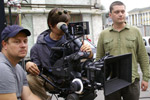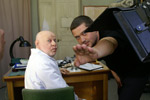April 3, 2012. Kyiv - New York |
Valentyn Vasianovych Debuts with "Business as Usual" |
| |
In early 2012 after six years of work, the director Valentyn Vasianovych finished his narrative feature film “Business as Usual” (Zvychaina sprava). Mr. Vasianovych is often mentioned among the most talented and promising of the post-Soviet generation of Ukrainian filmmakers. Having won the Special Jury Prize at the 7th International Short Film Festival at Clermont-Ferrand (February 2005), France, for his short Against the Sun (Proty Sontsia), he has been largely unemployed, incapable of securing financing for his projects. When studying at the Andrzej Wajda Film School in Poland, he developed a film idea that would be translated into his debut narrative feature after long years of on-again-off-again production. “Business as Usual” is a rare Ukrainian feature-length comedy, a genre that has all but stopped being made in contemporary Ukrainian cinema. It features an exciting line-up of actors: Taras Denysenko, Vitaly Linetsky, and Lesia Samayeva. Below is the interview Valentyn Vasianovych, a long-time friend and supporter of the Ukrainian Film Club at Columbia University, gave us in February, 2012.
 |
| Valentyn Vasianovych behind camera. |
Yuri Shevchuk: How much time was spent on the film, from when the script was written to the final product?
Valentyn Vasianovych: The script was written while I was at the Andrzej Wajda school for nine months. Then waiting for financing another year passed, and an additional four years were spent making the film. All together six years.
YS: How was the film financed? What was the overall budget?
VV: The overall budget was around 1 million US dollars, 90% - Ministry of Culture, 10% - private fund. It was financed in parts. The first half before the 2008 crisis, and the second part 2010-2011.
YS: How were the actors cast?
VV: First we looked for the protagonist, then we chose the rest. Taras Denysenko at the very beginning, then Vitaly Linetsky, and Lesia Samayeva. The most important criterion was that they fit the character type.
YS: Where did filming take place?
VV: Filming took place in Kyiv and several scenes in the suburbs.
YS: What difficulties were there in the production of the film?
VV: The biggest problem during filming was when we were forced to stop. Financing came in parts and each time it was difficult to gather a group and yet again resume working on the same exact film. The considerable problem was the financial crisis and consequently the inflation of the hryvnia. Because of exchange rate fluctuations we lost a large sum of money and we finish the film in debt.
 |
Shooting his film in Kyiv's Contract Square. |
YS: What part did your Polish colleagues played in the production of the film?
VV: At the very beginning there was a co-producer from the Polish side, however he saw the unpredictability of our system and withdrew from the project.
YS: What was your experience working with state institutions while making the film?
VV: The experience really varied. However, in the current system of state commission has significantly changed. Now the distribution of funds is quite clear, the budget on film work has markedly increased and they hope that the funds will get to film crews faster. The only negative moment is that now from the state you can only receive 50% of financing. They only finance 100% if it is a debut.
YS: What new have you learned in the process of working on this film?
VV: In that “Business as Usual” was my first experience in the game, really everything was new to me. But thanks to the large amount of time put into preparation for the project, on site there were no problems. The detailed storyboard, large number of rehearsals in the preparation period, it gave the group the ability to focus on the artistic side of the filming process on set.
YS: A few words about working with the leading characters: Tolik, Marta, and Slavik.
VV: The role of Tolik was performed by Taras Denysenko. There is a separate story with him. Having realized that Taras fit the
 |
On the set with Semion Furman. |
role of the protagonist, I started to work with him on his character and subsequently I found out that he is a great drawer. I invited him that he make the storyboards for the film. In three months we finished the storyboards for the entire film. After that, not one problem arose with the understanding of the character. Over that period of time Taras became the protagonist of the film. Then came Vitaly Linetsky. A lot of actors were auditioned for the role of Slavik, however the required chemistry between the protagonist and the candidate for the part of Slavik wasn’t there. Already from the first screen test it was clear that Vitaly would be Slavik. The chemistry between the actors, emotional tension, excitement, all of this was hard not to notice. It was a different story with Lesia Semayeva. For the role of Marta there were a few good candidates and the deciding factor was that Lesia matched the look for the role of the wife of the protagonist of the film.
YS: The film is in Ukrainian. Where there any problems connected with the language in the filming or financing of the picture.
VV: To me the only criterion for national identity is language. Ukrainian film must be in Ukrainian. We had no problems with this, on the contrary everything was entirely positive. There was one Russian actor involved in the film, Semion Furman, but even he learned his lines in Ukrainian.
YS: What does “Business as Usual” say about contemporary Ukraine? What is your message?
VV: The film is about strong and weak people. One people can easily obtain what they want, while the others lose everything to achieve their goals. In order to survive today you need to become strong.
YS: Which festivals will it be offered to for competition?
VV: In two or three weeks I will start sending the applications. Starting with the most prestigious festivals then the rest. I sent out close to a hundred applications, who responds is difficult to predict. But it is important to begin.
YS: When will the film be released? Who will distribute it?
VV: In theatres it will appear at the end of 2012, discussions with distributors are already underway. Unfortunately, I don’t have a lot of optimism, It is quite possible that its distribution will be limited to some three theatres in Kyiv and five more in the provinces.
Translated from Ukrainian by Sarah Diaz, Meriadek Darcel, Tara McCrimmons, and Nadia Woloszyn
|



